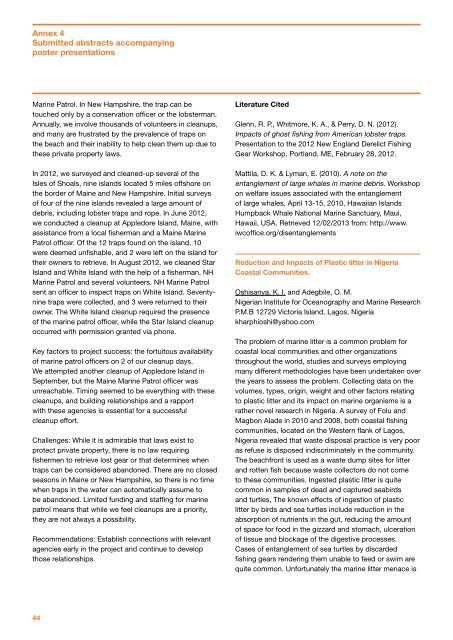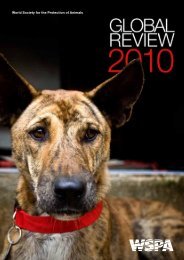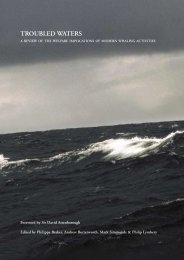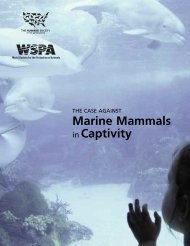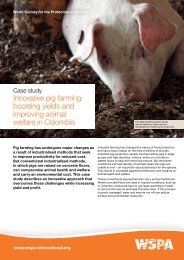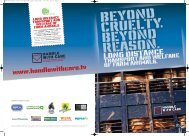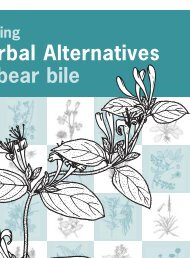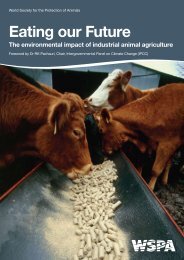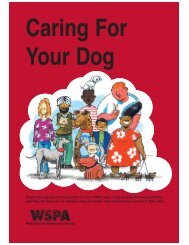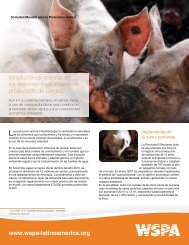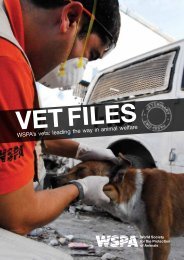Proceedings of the Untangled symposium: - WSPA
Proceedings of the Untangled symposium: - WSPA
Proceedings of the Untangled symposium: - WSPA
You also want an ePaper? Increase the reach of your titles
YUMPU automatically turns print PDFs into web optimized ePapers that Google loves.
Annex 4Submitted abstracts accompanyingposter presentationsMarine Patrol. In New Hampshire, <strong>the</strong> trap can betouched only by a conservation <strong>of</strong>ficer or <strong>the</strong> lobsterman.Annually, we involve thousands <strong>of</strong> volunteers in cleanups,and many are frustrated by <strong>the</strong> prevalence <strong>of</strong> traps on<strong>the</strong> beach and <strong>the</strong>ir inability to help clean <strong>the</strong>m up due to<strong>the</strong>se private property laws.In 2012, we surveyed and cleaned-up several <strong>of</strong> <strong>the</strong>Isles <strong>of</strong> Shoals, nine islands located 5 miles <strong>of</strong>fshore on<strong>the</strong> border <strong>of</strong> Maine and New Hampshire. Initial surveys<strong>of</strong> four <strong>of</strong> <strong>the</strong> nine islands revealed a large amount <strong>of</strong>debris, including lobster traps and rope. In June 2012,we conducted a cleanup at Appledore Island, Maine, withassistance from a local fisherman and a Maine MarinePatrol <strong>of</strong>ficer. Of <strong>the</strong> 12 traps found on <strong>the</strong> island, 10were deemed unfishable, and 2 were left on <strong>the</strong> island for<strong>the</strong>ir owners to retrieve. In August 2012, we cleaned StarIsland and White Island with <strong>the</strong> help <strong>of</strong> a fisherman, NHMarine Patrol and several volunteers. NH Marine Patrolsent an <strong>of</strong>ficer to inspect traps on White Island. Seventyninetraps were collected, and 3 were returned to <strong>the</strong>irowner. The White Island cleanup required <strong>the</strong> presence<strong>of</strong> <strong>the</strong> marine patrol <strong>of</strong>ficer, while <strong>the</strong> Star Island cleanupoccurred with permission granted via phone.Key factors to project success: <strong>the</strong> fortuitous availability<strong>of</strong> marine patrol <strong>of</strong>ficers on 2 <strong>of</strong> our cleanup days.We attempted ano<strong>the</strong>r cleanup <strong>of</strong> Appledore Island inSeptember, but <strong>the</strong> Maine Marine Patrol <strong>of</strong>ficer wasunreachable. Timing seemed to be everything with <strong>the</strong>secleanups, and building relationships and a rapportwith <strong>the</strong>se agencies is essential for a successfulcleanup effort.Challenges: While it is admirable that laws exist toprotect private property, <strong>the</strong>re is no law requiringfishermen to retrieve lost gear or that determines whentraps can be considered abandoned. There are no closedseasons in Maine or New Hampshire, so <strong>the</strong>re is no timewhen traps in <strong>the</strong> water can automatically assume tobe abandoned. Limited funding and staffing for marinepatrol means that while we feel cleanups are a priority,<strong>the</strong>y are not always a possibility.Recommendations: Establish connections with relevantagencies early in <strong>the</strong> project and continue to developthose relationships.Literature CitedGlenn, R. P., Whitmore, K. A., & Perry, D. N. (2012).Impacts <strong>of</strong> ghost fishing from American lobster traps.Presentation to <strong>the</strong> 2012 New England Derelict FishingGear Workshop, Portland, ME, February 28, 2012.Mattila, D. K. & Lyman, E. (2010). A note on <strong>the</strong>entanglement <strong>of</strong> large whales in marine debris. Workshopon welfare issues associated with <strong>the</strong> entanglement<strong>of</strong> large whales, April 13-15, 2010, Hawaiian IslandsHumpback Whale National Marine Sanctuary, Maui,Hawaii, USA. Retrieved 12/02/2013 from: http://www.iwc<strong>of</strong>fice.org/disentanglementsReduction and Impacts <strong>of</strong> Plastic litter in NigeriaCoastal Communities.Oshisanya, K. I. and Adegbile, O. M.Nigerian Institute for Oceanography and Marine ResearchP.M.B 12729 Victoria Island, Lagos, Nigeriakharphioshi@yahoo.comThe problem <strong>of</strong> marine litter is a common problem forcoastal local communities and o<strong>the</strong>r organizationsthroughout <strong>the</strong> world, studies and surveys employingmany different methodologies have been undertaken over<strong>the</strong> years to assess <strong>the</strong> problem. Collecting data on <strong>the</strong>volumes, types, origin, weight and o<strong>the</strong>r factors relatingto plastic litter and its impact on marine organisms is ara<strong>the</strong>r novel research in Nigeria. A survey <strong>of</strong> Folu andMagbon Alade in 2010 and 2008, both coastal fishingcommunities, located on <strong>the</strong> Western flank <strong>of</strong> Lagos,Nigeria revealed that waste disposal practice is very pooras refuse is disposed indiscriminately in <strong>the</strong> community.The beachfront is used as a waste dump sites for litterand rotten fish because waste collectors do not cometo <strong>the</strong>se communities. Ingested plastic litter is quitecommon in samples <strong>of</strong> dead and captured seabirdsand turtles, The known effects <strong>of</strong> ingestion <strong>of</strong> plasticlitter by birds and sea turtles include reduction in <strong>the</strong>absorption <strong>of</strong> nutrients in <strong>the</strong> gut, reducing <strong>the</strong> amount<strong>of</strong> space for food in <strong>the</strong> gizzard and stomach, ulceration<strong>of</strong> tissue and blockage <strong>of</strong> <strong>the</strong> digestive processes.Cases <strong>of</strong> entanglement <strong>of</strong> sea turtles by discardedfishing gears rendering <strong>the</strong>m unable to feed or swim arequite common. Unfortunately <strong>the</strong> marine litter menace is44


